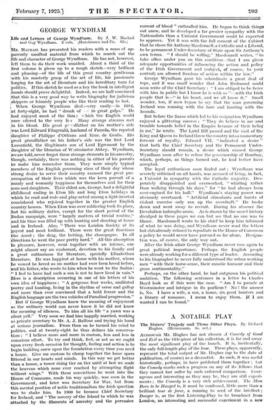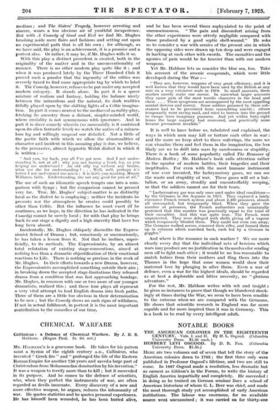A NOTABLE PLAY
The Sisters' Tragedy and Three Other Plays. By Richard Hughes. (Heinemann. 6s. net.) ALTHOUGH Mr. Hughes has not chosen A Comedy of Good and Evil as the title-piece of his collection, it is far and away the most significant play of the bunch. It is, incidentally, the only full-length play of the four. These plays, apparently, represent the total output of Mr. Hughes (up to the date of publication, of course) as a dramatist. As such, it was useful historically, perhaps, to have published them together ; but the Comedy marks such a progress on any of its fellows that they cannot but suffer by such enforced comparison. Cour- ageous and interesting as they may be, they are still experi- ments; the Comedy is a very rich achievement. The Man Born to be Hanged is, it must be confessed, little more than a brilliant tour de farce, a running to seed of the intellect ; Danger is, as the first Listening-Play to be broadcast from London, an interesting and successful experiment in a new medium ; and The Sisters' Tragedy, however arresting and sincere, wears a too obvious air of youthful inexperience.
But with A Comedy of Good and Evil we find Mr. Hughes
brushing aside mere fiairs and fashions and setting out upon an experimental path that is all his own ; for although, as we have said, the play is an achievement, it is a promise and a portent also. Or rather, it may be, if Mr. Hughes wills it so.
With this play a distinct precedent is created, both in the originality of the matter and in the unconventionality of manner. There is no other modern play quite like it ; and when it was produced lately by the Three Hundred Club it proved such a puzzler that the ingenuity of the critics was severely taxed to find some appropriate tag by which to label
it. The Comedy, however, refuses to be put under any accepted modem category. It stands alone. In part it is a queer
mixture of realism and fantasy, holding the balance nicely between the miraculous and the natural, its dark realities fitfully played upon by the shifting lights of a Celtic imagina- tion. In part it comes nearest to the mediaeval morality-play, fetching its ancestry from a distant, simpler-minded world, where credulity is not synonymous with ignorance. And in part it is sheer comedy wherein (so successfully is it contrived upon its alien fantastic level) we watch the antics of a miracu- lous leg and willingly suspend our disbelief. Not a little of the poetic faith with which we allow the abnormalities of character and incident in this amazing play is due, we believe, to the persuasive, almost hypnotic Welsh dialect in which it is written :—
"And you, leg bitch, you all I've got now. And I not under- standing it, not at all : why you not having a head, leg, so you helping me understand ? An old silly leg without any brains, what use she for understanding ? . . . Well, well, perhaps its better I not understand too mum : it is faith you wanting, Minnie Williams, faith. Understanding, she not any good for you at all."
The use of such an idiomatic speech tempts one into a com- parison with Synge ; but the comparison cannot be pressed very far. True, Mr. Hughes' subject-matter is as distinctly local as the dialect he is employing ; neither the incidents he presents nor the atmosphere he creates could possibly be
other than Celtic. But the influence he must exert (if he continues, as we hope, in the direction he has indicated in the Comedy) cannot be merely local ; for with that play he brings back to our stage a dignity and a high sincerity that have too long been absent.
Incidentally, Mr. Hughes obliquely discredits the Expres- sionist School of Drama ; but, consciously or unconsciously, he has taken a lesson from it. Not that he inclines, super- ficially, to its methods. The Expressionists, by an almost total refutation of existing stage-conventions, aimed at nothing less than a dramatic objectification of their emotional reactions to Life. There is nothing so precious in the work of Mr. Hughes. In their efforts towards a new Drama, however, the Expressionists accomplished something outside their aim ; in breaking down the accepted stage-limitations they released drama from a condition that was fast approaching bondage. Mr. Hughes, in common with one or two more of our younger dramatists, realized this ; and these four plays all represent a very vital attempt to lead English drama into fresh paths. Three of them are a_ little too obvious in their determination
to be new ; but the Comedy shows no such signs of wilfulness. If not in actual fulfilment, in portent it is the most important
contribution to the comedies of our time.











































 Previous page
Previous page